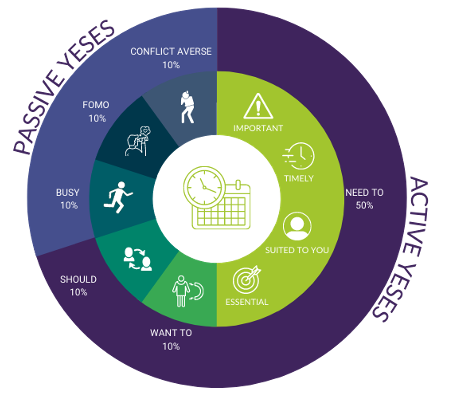It’s NOvember, the month where I provide 30 days of things to say NO to if you want to be happier, healthier, and more productive. Join the NOvember crusade on LinkedIn or in daily 60-second video shorts.
Last week, I kicked off this year’s NOvember with twelve categories where obligations might be piling up in your life, obscuring your view of what really matters. They ranged from the mundane (like needing to unsubscribe from low-value emails) to the profound (such as addressing the unequal division of emotional labor in your relationships). So it might help to check out that list first if you didn’t see it.
Now, it’s time to tackle the plaque of obligations making you less happy, healthy, and productive than you could be. The place to start is to understand what made you say “yes” to those responsibilities in the first place.
What Makes You Take on Too Much?
Although you’ve probably met a few people whose default answer to any question is “no,” for most of us, the tendency is to go along, acquiesce, agree, accept, and accommodate. So for most of us, the default answer is “yes.” But there are many different versions of yes, and some are more troubling than others.
The Active Yeses
Some reasons to say “yes” are active because you deliberately choose to go along.
The active yes includes what you need to, want to, and should do.
I Need To
In my online learning course about productivity called Staying Out of the Weeds, I describe the ideal “yes” as a task that fits the following four criteria: A task that is:
Important: it will impact outcomes that matter, and not doing it would be a lost opportunity and might even create a risk.
Timely: it needs to be done now, and delaying it would lead to worse outcomes.
Suited to You: this task would benefit from you being the one to do it. No one could do it better, faster, or cheaper than you.
Essential: this specific part of the task is critical. It’s central to getting the desired outcome rather than a superfluous nice-to-have add-on or an inefficient, clunky way of doing things.
If we use a plate metaphor, you want most of your plate covered by things that are important, timely, suited to you, and essential. That’s the nourishing stuff.
The good news is that even if you have a hearty serving of need-to-do items, you likely have room to say “yes” to some side dishes. The biggest category of sides should be things you want to do.
I Want To
This category includes activities that might not be right in your sweet spot, but they’re things you’d like to do anyway.
Interest, Excitement, Curiosity: Maybe what’s on offer is exciting to you. For example, you might want to attend the preview of a new technology your IT department is rolling out. These are the opportunities that come across your desk that are cool, intriguing, or fun.
Boredom with Current Tasks: Another category of yeses is the things you say yes to because you are desperate for some variety or a break from a monotonous or vexing task that’s getting you down. You might be tempted to add more to your plate just because you can’t bear to take another bite of what you’ve been chewing on for too long.
I’m not saying that you shouldn’t say “yes” to these activities. You need some enjoyable, exciting activities in your week to keep you engaged. However, I do want you to remember a couple of things.
Don’t let saying “yes” to something you want to do compromise your ability to complete the work you need to do effectively.
Don’t take on too long or too varied a list of want-to activities, or they’ll become a burden rather than a benefit.
I Should
The third category of things you might actively say “yes” to includes things you should do. We live in a social world, and doing things for the benefit of others can be a good reason to do them.
Not Wanting to Let Someone Down: In plenty of situations, it’s not that you want to say “yes,” it’s just that you feel you ought to. For example, maybe the requestor is someone you genuinely like, and you want to help them out. Alternatively, perhaps it’s someone with whom you want to curry favor. This “yes” is less about the task you’re taking on and more about the person who asked.
Reciprocity: Another strong compulsion to say “yes” comes in scenarios where you feel you owe it to the person. You asked them to come to your charity fundraiser, and now they’re asking you to go to theirs. Reciprocity has its place in a healthy community as long as you know what is going on and are willing to limit it so that you don’t spend your life feeling you have to keep accounts of who owes what to whom.
Ideally, you want most of the obligations you take on to come from these different forms of active yeses. If this was a Thanksgiving dinner plate, your Need Tos are the turkey, your Want Tos are the stuffing (or the cranberry sauce), and your Shoulds are the broccoli casserole.
The Passive Yes (or the Missing No)
Unfortunately, there is likely a lot on your plate that you don’t want there, it just got served up, and you didn’t know how to say “no” politely. These items aren’t there because you said “yes,” they’re there because you couldn’t muster a “no.”
Busy Culture: There was no inherent value in the activity; you just feel like the busy people are the ones who get rewarded, so you took what came at you.
Fear of Missing Out: Again, nothing about the task made you want to sign up, except for the possibility that not signing up would mean you miss out on something fun or communal. In our strange, perverted world, you might even have FOMO about missing out on something truly terrible because you know that being part of it will be a bonding experience or badge of honor later.
Conflict Aversion: In this case, you know darn well that saying “yes” to this activity is not the way to go, but you don’t know how to stand up for yourself or how to take on someone who might have more power than you (or at least more bluster).
I don’t know what the equivalent is on your Thanksgiving plate, but this is the stuff you choke down and then suffer with the reflux later. This is the first place to start clearing out obligations.
Ask yourself, am I saying “yes” to this because it is the best use of my time and energy? Or, is it that I want to say “yes” for the wrong reasons, I feel obliged to say “yes,” or I just can’t muster a “no?” It will be hard to reclaim your time and attention until you understand what has been robbing you of it in the first place.

Further Reading
5 busy person mistakes to avoid
Why You’re So Busy and How to Ruthlessly Prioritize
Video: My favorite technique for getting to the right yeses. 1 Yes, and 3 Less
Expert: Four Ways to Break Away from the Busy Culture by Rikki Rogers
